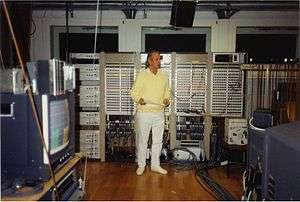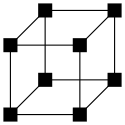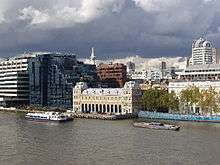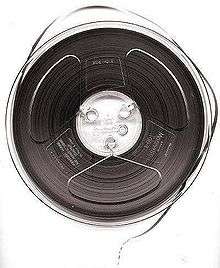Oktophonie
Oktophonie (Octophony) is a 1991 octophonic electronic-music composition by Karlheinz Stockhausen. A component layer of act 2 of the opera Dienstag aus Licht, it may also be performed as an independent composition. It has a duration of 69 minutes.


Function in Dienstag
Oktophonie forms a layer of the music in act 2, Invasion—Explosion mit Abschied (Invasion—Explosion with Farewell). The very forceful nature of the electronic music required a technical solution in order that the instrumentalists, who perform at the same time, can always be heard. Stockhausen solved this problem by providing each player with a microphone and a transmitter for amplification, which allows them to move freely throughout the auditiorium. This became a central part of Stockhausen’s performance practice in subsequent parts of the Licht cycle (Toop 2008).
Materials and technique

Oktophonie was realised in the Studio for Electronic Music of the Westdeutscher Rundfunk, Cologne, in two phases of work: from 23 August to 30 November 1990, and from 5 to 30 August 1991. Studio collaborators were recording engineers Volker Müller and Daniel Velasco-Schwarzenberger, and recording technician Gertrud Melcher (Stockhausen 1994, O IX, O XIX; Stockhausen 1998, 340). Production was made using a single 24-track tape recorder. A 64-track recorder would have been preferable, or alternatively three synchronisable 24-track recorders, but the WDR studio had only the one machine. Spatialisation was facilitated by the use of a QUEG (Quadrophonic Effect Generator), a device manufactured by EMS in the early 1970s. It was developed by Stockhausen in collaboration with Peter Zinovieff, owner of the firm at that time. Despite having only four outputs, the QUEG could still be used to produce an octophonic output, by manually switching to four outputs, not only between the square on the floor and the one on the ceiling, but between all six squares forming the sides of the cube (Stockhausen 2000, 68–70). A number of synthesizers and modules were used in the production of the sound layers (Stockhausen 1994, O IX, O XIX):
- two Yamaha DX7II-FD synthesizers
- two Casio FZ-1 samplers
- a Roland D-50 synthesizer
- an Oberheim Matrix-1000 synthesizer module (without keyboard)
- an Art Proverb effects unit
- a Roland SDE 2000 reverberation unit
- an SVC 350 vocoder
- an Atari 1040 St computer
- C-Lab Unitor Hardware and Notator Software
- a Yamaha MR 12/4/2 mixing console
In addition, an EMS Synthi 100 was used for control of the spatialization in some layers during the concluding portion (Stockhausen 1994, O XV–XVI, O XXV–XXVI).
Analysis
The music of Oktophonie is developed, like everything in Licht, from the basic superformula, and consists of eight musical layers, each provided with different spatial distributions and sound movement patterns (Misch 1999, 152). For technical reasons of playback the music had to be produced in two segments, with the second tape beginning at 36'23" and a "bridge" tape used only for performances of the second act of Dienstag (Stockhausen 1994, O IX, O XIX; Stockhausen 1998, 342).
Performance history

- 1991: World premiere, 29 September, Frankfurt, in the context of the concert premiere of Dienstag aus Licht, given as the conclusion of the Frankfurt Feste '91 (Stockhausen 1993, 163).
- 1993: in the context of the staged world premiere of Dienstag, 28 May, Leipzig Opera (Toop 2008).
- 1994: World premiere of the electronic music alone, 12 June, at the restaurant of the Cologne-Deutz fairgrounds, organised by the Westdeutscher Rundfunk as part of the Kölner Trienniale (Stockhausen 1994, O IX, O XIX; Stockhausen 1998, 342; Stockhausen-Stiftung für Musik 2010, 5).
- 1998: South American premiere, São Paulo, Brazil, at the International Festival of Electroacoustic Music of São Paulo (BIMESP), held 8–17 October (Anon. 1999; Brümmer et al. 2001, 11).
- 2002: Neue Nationalgalerie at the Kulturforum, Berlin (Trinkl 2007).
- 2002: Stockhausen Courses, Kürten (Moritz 2005).
- 2004: Sonorities Festival, Queen's University Belfast, Sonic Arts Research Centre, Belfast, Northern Ireland, Sunday 25 April (Dervan 2004).
- 2005: Triptych Festival, Queen's Hall, Edinburgh, Saturday 30 April (Walton 2005).
- 2005: West Coast Festival of Numusic 2005, Tou Old Brewery, Stavanger, Norway, Friday 26 August (Solberg 2005; Stockhausen-Stiftung für Musik 2005).
- 2005: Frieze Festival, Old Billingsgate Market, London, 25 October (Anon. 2006; Ashley 2005; Higgins 2005; Sweeting 2005).
- 2007: Stockhausen Courses, Kürten, 15 July (Stockhausen 2007, 23–24, 41–42).
- 2008: Fromm Players at Harvard: 60 Years of Electronic Music, 8 March (Anon. 2008, 11).
- 2008: Stockhausen Courses, Kürten, 7 July (Stockhausen-Stiftung für Musik 2008, 20–22, 62–64).
- 2009: Durham University Musicon series, Music and Electronics, 19 March (Anon. 2009).
- 2009: version with soloists (Signale zur Invasion with Ben Marks, trombone; Pietà with Tristram Williams, flugelhorn, and Jessica Aszodi, soprano; Synthi-Fou with Michael Fowler, electronic keyboards):
- Turbine Hall, Brisbane Powerhouse, Brisbane, Australia, 25 April (Anon. 2011).
- Sydney Conservatorium of Music, as part of Smart Light Sydney Festival (a component of Vivid Sydney), Sydney Australia, Saturday, 6 June (Anon. 2011; Fortescue 2009; McCallum 2009).
- 2009: Stockhausen Courses, Kürten, 14 July (Layton 2009).
- 2010: Paris, 26 March, two performances, "avec le soutien technique de Diversity", 4:00pm and 9:00pm, Atelier 4, 104 rue d'Aubervilliers (Ning 2010).
- 2011: Version with soloists (Signale zur Invasion with Andrew Digby, trombone; Pietà with Marco Blaauw, flugelhorn, and Agata Zubel, soprano; Synthi-Fou with Antonio Pérez-Abellán, electronic keyboards), sound projection: Kathinka Pasveer. Stockhausen Courses, Sülztalhalle, Kürten, 9 August (Schwarz 2011).
- 2013: Park Avenue Armory, 9 performances, sound projection: Kathinka Pasveer; design: Rirkrit Tiravanija (Anon. 2013; Mejias 2013; Tharoor 2013; Tommasini 2013).
Discography
- Stockhausen: Oktophonie. Stockhausen Complete Edition CD 41. Kürten: Stockhausen-Verlag, 1994.
- Stockhausen: Dienstag aus Licht. Annette Meriweather (soprano); Julian Pike (tenor); Nicholas Isherwood (bass); Markus Stockhausen (trumpet and flugelhorn); Michael Svoboda (trombone); Massimiliano Viel, Simon Stockhausen (synthesizers); Andreas Boettger, Renee Jonker (percussion); WDR Choir, Karlheinz Stockhausen (cond.). Stockhausen Complete Edition CD 40A–B. Kürten: Stockhausen-Verlag, 1996.
- Stockhausen: Solo-Synthi-Fou; Synthi-Fou; Dienstags-Abschied; Klangfarben für Synthi-Fou. Simon Stockhausen (synthesizers); WDR Choir, Karlheinz Stockhausen (cond.). Stockhausen Complete Edition CD 42 A–B. Kürten: Stockhausen-Verlag, 1994.
- Stockhausen: Michaels-Ruf; Bassettsu; Synthi-Fou; Quitt; Komet; Trompetent. Stockhausen Complete Edition CD 82. Kürten: Stockhausen-Verlag, 2007.
References
- Anon. 1999. “News: International Biennial of Electroacoustic Music of São Paulo”. Computer Music Journal 23, no. 1 (Spring): 8–9.
- Anon. 2006. “News: Stockhausen in London”. Computer Music Journal 30, No. 2 (Summer): 6.
- Anon. 2008. "Fromm Players at Harvard 3.7–3.8 2008: 60 Years of Electronic Music" (display advertisement). Harvard University Department of Music: Music Newsletter 8, no. 1 (Winter): 11 (accessed 1 September 2014).
- Anon. 2009. "Music and Electronics, Elvet Methodist Church, Durham". Durham Times (Friday 20 March).
- Anon. 2011. "People: M. Fowler Performances". SIAL (Spatial Information Architecture Laboratory), RMIT University (Accessed 13 April 2013).
- Anon. 2013. "March 20–27: Oktophonie: Karlheinz Stockhausen & Rirkrit Tiravanija". Park Avenue Armory Programs (Accessed 12 April 2013).
- Ashley, Tim. 2005. "Karlheinz Stockhausen: Old Billingsgate Market, London". The Guardian (Monday 24 October).
- Brümmer, Ludger, Guenther Rabl, Konrad Boehmer, Jean-Claude Risset, Jonty Harrison, François Bayle, Johannes Goebel, Francis Dhomont, and Karlheinz Stockhausen. 2001. "Is Tape Music Obsolete? Is Spatialization Superficial?" Computer Music Journal 25, no. 4 (Winter): 5–11.
- Dervan, Michael. 2004. "Sonorities—Various Venues, Belfast". The Irish Times (Wednesday 28 April, City Edition): 14.
- Fortescue, Elizabeth. 2009. "Sydney's Carnival of Light". Daily Telegraph (6 May).
- Higgins, Charlotte. 2005. "Stockhausen to Play Concert in London". The Guardian (3 August) (Accessed 14 April 2013).
- Kohl, Jerome. 2004. "Der Aspekt der Harmonik in Licht". In Internationales Stockhausen-Symposion 2000: LICHT. Musikwissenschaftliches Institut der Universität zu Köln, 19. bis 22. Oktober 2000. Tagungsbericht, edited by Imke Misch and Christoph von Blumröder, 116–36. Signale aus Köln 10. Münster: Lit-Verlag. ISBN 3-8258-7944-5.
- Layton, Steve. 2009. "Get Your Stockhausen On!" Sequenza 21/The Contemporary Classical Community (Accessed 14 April 2013).
- McCallum, Peter. 2009. "More Than a Little Licht Music". Sydney Morning Herald (12 June): §1:12.
- Maconie, Robin. 2005. Other Planets: The Music of Karlheinz Stockhausen. Lanham, Maryland, Toronto, Oxford: The Scarecrow Press, Inc. ISBN 0-8108-5356-6.
- Mejias, Jordan. 2013. "Stockhausen in New York: Auf Socken in den Kosmos". Frankfurter Allgemeine Zeitung (30 March).
- Miller, Paul. 2009. "Stockhausen and the Serial Shaping of Space". Ph.D. dissertation. Rochester: University of Rochester, Eastman School of Music.
- Misch, Imke. 1999. "Wir können noch eine Dimension tiefer gehen ...: Zur Gestaltung des Raumes in der Elektronischen Musik Karlheinz Stockhausens". In Internationales Stockhausen-Symposion 1998: Musikwissenschaftliches Institut der Universität zu Köln 11. bis 14. November 1998: Tagungsbericht, edited by Imke Misch and Christoph von Blumröder, 147–55. Signale aus Köln 4. Saarbrücken: Pfau-Verlag. 3-89727-050-1.
- Moritz, Albrecht. 2005. "Stockhausen: Oktophonie (Octophony), 1990/91", second edition. Al Moritz website (Accessed 12 April 2013).
- Ning, Liu. 2010. "Concerts gratuits, dans la limite des places disponibles". Paris8 CICM Composition et oridinateur [sic] (Accessed 13 April 2013).
- Overholt, Sara Ann. 2006. "Karlheinz Stockhausen's Spatial Theories: Analyses of Gruppen für drei Orchester and Oktophonie, Electronische [sic] Musik vom Dienstag aus LICHT". Ph.D. dissertation. Santa Barbara: University of California at Santa Barbara.
- Schwarz, Gisela. 2011. "Ein Kampf mit der Posaune". Kölner Stadt-Anzeiger (11 August) (Accessed 16 April 2013).
- Schwerdtfeger, Dettloff. 1999. "Die Tempo- und Dauernproportionen der Superformel für LICHT". In Internationales Stockhausen-Symposion 1998: Musikwissenschaftliches Institut der Universität zu Köln 11. bis 14. November 1998: Tagungsbericht, edited by Imke Misch and Christoph von Blumröder, 227–34. Signale aus Köln 4. Saarbrücken: Pfau-Verlag. 3-89727-050-1.
- Solberg, Tor. 2005. "Numusic Festival, Scandinavia's Biggest Electro Event, Kicks Off in Stavanger, Norway". Tourdates.co.uk (25 August) (Accessed 16 April 2013).
- Stockhausen, Karlheinz. 1993. "Octophony: Electronic Music from Tuesday from Light", translated by Jerome Kohl. Perspectives of New Music 31, no. 2 (Summer): 150–70.
- Stockhausen, Karlheinz. 1994. Oktophonie: Elektronische Musik vom Dienstag aus Licht. 1990/91, Werk Nr. 1 ex 61 (score), English translations by Suzanne Stephens and Jerome Kohl. Kürten: Stockhausen-Verlag.
- Stockhausen, Karlheinz. 1998. "Oktophonie (1990/91): Elektronische Musik vom Dienstag aus Licht". In his Texte zur Musik 8, edited by Christoph von Blumröder, 339–75. Kürten: Stockhausen-Verlag. ISBN 3-00-002131-0.
- Stockhausen, Karlheinz. 2000. "Neue Raum-Musik: OKTOPHONIE". In Komposition und Musikwissenschaft im Dialog I (1997–1998), edited by Imke Misch and Christoph von Blumröder, 60–77. Signale aus Köln: Musik der Zeit 3. Saarbrücken: Pfau-Verlag. ISBN 3-89727-049-8.
- Stockhausen, Karlheinz. 2007. 2007 Stockhausen-Kurse Kürten: Programm zu den Interpretations- und Kompositionskursen und Konzerten der Musik von / Programme for the Interpretation and Composition Courses and Concerts of the Music of Karlheinz Stockhausen, 7. Juli bis 15. Juli 2007 in Kürten / from July 7th to 15th 2007 in Kuerten. Kürten: Stockhausen-Verlag.
- Stockhausen, Karlheinz, Pay-Uun Hiu, and Alcedo Coenen. 2008. "'Der differenziertere Mensch ist der akustische Mensch': Karlheinz Stockhausen im Gespräch über Oktophonie". MusikTexte: Zeitschrift für Neue Musik, no. 116 (February): 53–63.
- Stockhausen-Stiftung für Musik. 2005. "Stockhausen Performances 2005" (Accessed 16 April 2013).
- Stockhausen-Stiftung für Musik. 2008. 2008 Stockhausen-Konzerte und -Kurse Kürten: Programm zu den Konzerten und Kursen der Musik von / Programme for the Concerts and Courses of the Music of Karlheinz Stockhausen, vom 4. Juli bis 20. Juli 2008 in Kürten / from July 4th to 20th 2008 in Kuerten. Kürten: Stockhausen-Stiftung für Musik.
- Stockhausen-Stiftung für Musik. 2010. Stockhausen: August 22nd 1928 – December 5th 2007 [Short Biography and Work List, English edition]. Kürten: Stockhausen-Verlag.
- Sweeting, Adam. 2005. "Shrieks, Howls and Illusions". The Telegraph (26 October).
- Tharoor, Ishaan. 2013. "Can a Sound Installation Take You to Outer Space?" Time (1 April).
- Toop, Richard. 2008. "Dienstag aus Licht ('Tuesday from Light')". Grove Music Online: The New Grove Dictionary of Opera (22 October) (Subscription access) (Accessed 17 April 2013).
- Trinkl, Garth. 2007. "In Memorium [''sic''], Karlheinz Stockhausen". Renaissance Research (9 December) (Accessed 14 April 2013).
- Tommasini, Anthony. 2013. "In Space You Can Still Hear the Drones: Karlheinz Stockhausen's Oktophonie at the Park Avenue Armory". The New York Times (21 March).
- Walton, Kenneth. 2005. "Triptych Festival: Karlheinz Stockhausen". The Scotsman (2 May): 26.
Further reading
- Clarke, J. M., and Peter Manning. 2009. "Valuing Our Heritage: Exploring Spatialisation through Software Emulation of Stockhausen's Oktophonie". In Proceedings of the International Computer Music Conference (ICMC 2009), Montreal, Canada, 179–82. [N.p.]: International Computer Music Association.
- Clarke, Michael, and Peter Manning. 2008. "The Influence of Technology on the Composition of Stockhausen's Octophonie [sic], with Particular Reference to the Issues of Spatialisation in a Three-Dimensional Listening Environment". Organised Sound 13, no. 3 (December): 177–87. doi:10.1017/S1355771808000277
- Frisius, Rudolf. 2013. Karlheinz Stockhausen III: Die Werkzyklen 1977–2007. Mainz, London, Berlin, Madrid, New York, Paris, Prague, Tokyo, Toronto: Schott Music GmbH & Co. KG. ISBN 978-3-7957-0772-9.
- Ulrich, Thomas. 2017. Stockhausens Zyklus LICHT: Ein Opernführer. Cologne, Weimar, and Vienna: Böhlau Verlag GmbH & Cie. ISBN 978-3-412-50577-6.
